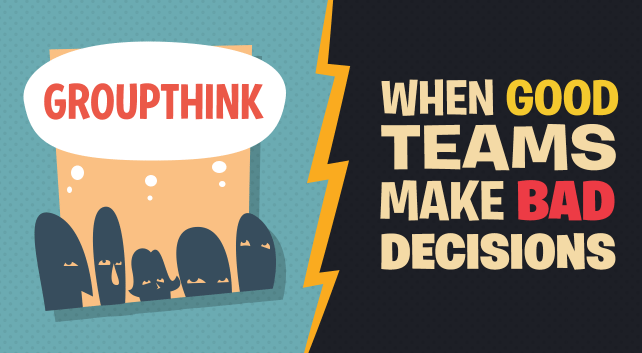- leadership
- Blog post
When good teams make bad decisions: Six ways to prevent groupthink
When great minds come together, they can accomplish just about anything:
The Bay of Pigs invasion. The Vietnam War. Investing in mortgage-backed securities. The AOL-Time Warner merger. You name it.
What these profoundly bad ideas have in common is that they were all vetted and approved by the best brains in their respective fields — often with little dissent or discussion.
In hindsight, everybody — including those who were sitting at the table — can point to the culprit: groupthink.
Yet knowing the name of the disease doesn’t prevent you from catching it. I’ll confess that I’ve succumbed to it myself — as a team member and as a team leader.
Looking back, perhaps the most striking thing about those experiences is that they didn’t feel like groupthink. These weren’t situations where everybody was hugging and singing kumbaya. Or where people were going along just to get along. Or where an overbearing personality bullied others into accepting their ideas. These were thoughtful, honest discussions among people who knew their stuff and weren’t afraid to speak up.
And yet groupthink happened anyway.
Expect groupthink and plan for it
The point is that you can’t out-think groupthink. It doesn’t happen because people are too dumb to see what’s happening. It’s deeply rooted in the structure of teams and the psychology of interpersonal relationships.
Which means that the only way to avoid groupthink is by proactively engineering the team’s decision-making process. Here are six strategies to consider:
1. Appoint a devil’s advocate
One study found that appointing someone as devil’s advocate — whose only job is to challenge the group’s consensus — is an effective antidote to groupthink. The key is to make the role formal. It has to be someone’s explicit job to be the fly in the ointment. Otherwise, there’s too much pressure to get with the program.
2. Set up a debate
The same study found an equally effective strategy for improving the quality of group decisions. Researchers and academics call it “dialectical inquiry.” Essentially, it means dividing the group into two teams — one to argue in favor of a proposition and one to argue against it. It works for reasons similar to a devil’s advocate: The team arguing “against” will dig harder to identify logical flaws and disconfirming evidence. A team approach overcomes some of the social pressure that a single devil’s advocate may feel (even when everyone knows it’s your job to be a naysayer, it’s not a comfortable role). But it requires more planning and effort.
3. Create multiple teams
Another variation: Set up multiple teams, working independently, to explore solutions to the same problem. That way you get greater independence of thinking, and less risk that consensus seeking will shut down divergent thinking. Of course, groupthink can still happen within each team, but when you eventually bring everyone together, the effects tend to cancel out.
4. Invite outside experts to evaluate the decision
Outside experts aren’t as invested in the process or the outcome as the people who developed the solution. Outsiders won’t know, for example, which ideas generated the most enthusiasm. They don’t know how much effort was expended to come up with something everyone could buy into. All they have to go on is the decision itself. And that’s a good thing. Because the quality of a decision has little to do with how much effort was put into it or how much people liked it.
5. Have each team member get outside views before the meeting
When team members discuss an issue with other people before the meeting, they’ll have more insights to share. And they’ll be less likely to get steamrolled by what happens during the meeting. They’ll be asking themselves, “How would this idea play with the people I talked to before?”
6. If you’re the leader, lay low
Your views carry far more weight than those of others in the group. Even when you invite people to challenge you, they will unconsciously look to you for signals about what you want to happen or what you think is best. As the leader, your most valuable role is to evaluate the decisions that the group proposes. If you’re also involved in developing those same decisions, you’ll inevitably end up critiquing your own ideas — a recipe for groupthink. A better approach: Stay out of the process as much as you can. Avoid the working meetings if possible. Or if you must attend, keep your opinions to yourself.
Source: Schweiger, D.M., et al. (1989) Experiential effects of dialectical inquiry, devil’s advocacy and consensus approaches to strategic decision making. Acad Manage J 32(4)745-72.

Get a demo of all our training features
Connect with an expert for a one-on-one demonstration of how BTS Total Access can help develop your team.




